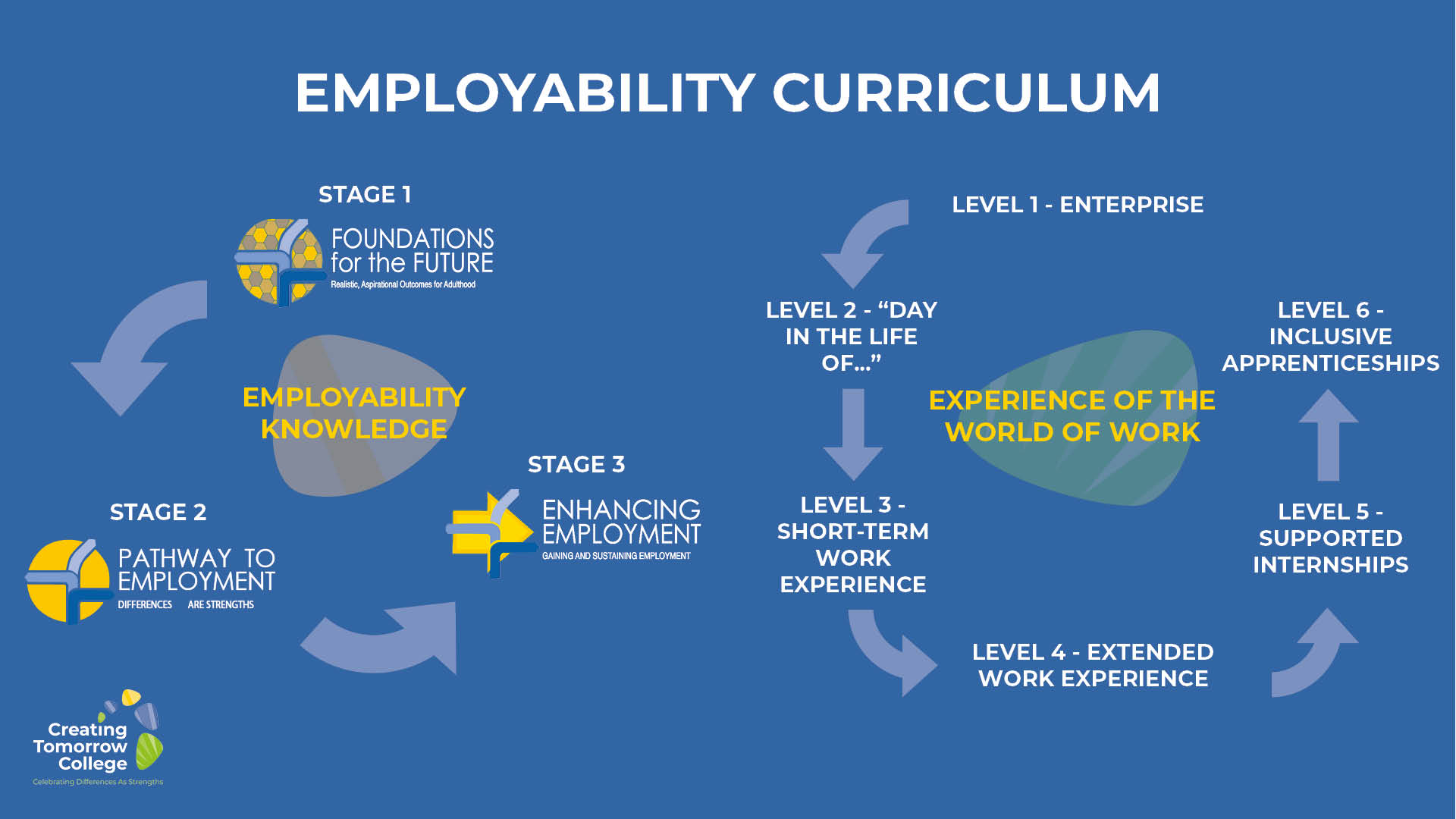Employability

Along with the Development of Character, our employment curriculum model consists of two other very distinct areas:
-
Curriculum (employability knowledge)
-
Experience of the World of Work (employability skills)
Both elements work hand in hand to provide an effective programme that enables the student to gain foundational knowledge then apply it in real life situations.
 We believe that each element in isolation does not give the student the best opportunity to succeed in the adult world. However, a personalised combination of both elements, pitched at an appropriate level, will help the young adult to understand the demands of a workplace, develop the knowledge and skills to gain, and sustain, meaningful employment throughout their adult life.
We believe that each element in isolation does not give the student the best opportunity to succeed in the adult world. However, a personalised combination of both elements, pitched at an appropriate level, will help the young adult to understand the demands of a workplace, develop the knowledge and skills to gain, and sustain, meaningful employment throughout their adult life.
Development of Knowledge
We understand the importance of providing a framework for teachers/tutors to deliver knowledge that sequentially builds over time. To support this, the knowledge acquisition section of our curriculum is delivered across three different stages in our post 16 provisions and post 18 programmes.

Stage 1: Foundations for the Future
(College staff are able to deliver this stage at post 18, if assessments indicate gaps in foundational student knowledge)

Stage 2: Pathway to Employment

Stage 3: Supported Internship Specific Content included
To ensure that students receive a broad curriculum that supports knowledge prior to employment, while gaining employment and when in employment, each stage is divided into five different delivery areas:
- Pre-Employment
- Gaining Employment
- Workplace Core Competencies
- Essential Workplace Knowledge
- Essential Digital Skills (Stage 2 & 3 Only)
By ensuring our students have knowledge at each stage of the employment cycle, we are confident that they will be able to gain, sustain and change employment pathways throughout their adult life.
Acquisition of skills for successful employment
We recognise that our students will benefit from a range of different practical application opportunities based on their employability development stage, age and identified outcomes. The best outcomes are gained when students are provided a significant amount of experience to learn, reflect and adapt their approach to the world of work. This is why we offer 6 different levels of experience and students will access the one that is most appropriate for them.

Level 1 — Enterprise
Every student in college will experience 'Enterprise' which introduces them to the basic concepts of manufacturing or service, providing them with the opportunity to understand the principles of cost, profit and reinvestment.
Level 2 — ‘A Day in the Life of...’
This stage provides the opportunity for students the ability to observe and ‘feel’ what is like to work in a chosen sector. The benefit of these experiences enables the student to prepare themselves for level 3.
Level 3 — Short Term Work Experience
This level enables the student to access a ‘traditional’ block of work experience, putting learning into practice. This will normally consist of a week or two week block placement, which provides the opportunity to build work stamina.
Level 4 — Extended Work Experience.
Students accessing our Employment curriculum will benefit from accessing extended work experience dependent on their personalised, identified outcome for employment. This may take the form of practical work experience for anything up to 3 days a week, therefore providing extended opportunities to develop skills for the workplace to gain and sustain meaningful employment in adult life.
Level 5 — Supported Internships.
Supported Internships offer the intern the opportunity to continue with their education while attending a yearlong work placement. During the internship, the intern will no longer attend college - they will work in an identified business supported by a Job Coach employed by the college. The education programme will be delivered on site to the intern by the college. These are appropriate for those that will be ready to gain meaningful employment following the programme. They are not a route into further education.
Level 6 — Inclusive Apprenticeships.
An inclusive apprenticeship is very similar to a standard apprenticeship. However, since the Maynard Review, the Institute for Apprenticeships (IfA) guidance now requires end point assessments to be subject to reasonable adjustments.
The Department for Education announced changes to Maths and English requirements for apprentices who have special educational needs, learning difficulties or disabilities. Specific criteria have to be met and evidenced, and these are detailed in the Specification of Apprenticeship Standards for England. For these apprentices, exemptions are in place for the regular English and Maths minimum requirements. This exemption allows the apprentice to use an Entry Level 3 qualification in English or Maths as an acceptable alternative.
Notes:
- Levels 1 - 4 are delivered on our Pathway to Employment Study Programme.
- Levels 5 - 6 are delivered following our Pathway to Employment study programme.

